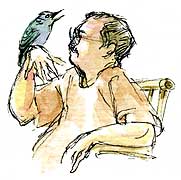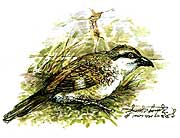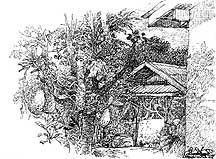Art on the wing
Stories by VASANA CHINVARAKORN, Bangkok Post, Aug 21, 2005
Bangkok, Thailand -- He spent many years teaching art, now a retired university lecturer is finding that Nature, in feathered form, has a lot to teach us about the art of living responsibly.
 << "I'm simply a person who loves birds ... definitely not an expert," insists Bandit Pradungwichein, whose open house has received many visitors - avian and human - over the last decade. The retired art lecturer believes that wild birds will survive the ill-effects of human activity, not because tomes of research have been done on them but simply because "there are many people who love these creatures". — Illustrations courtesy of BANDIT PRADUNGWICHEIN
<< "I'm simply a person who loves birds ... definitely not an expert," insists Bandit Pradungwichein, whose open house has received many visitors - avian and human - over the last decade. The retired art lecturer believes that wild birds will survive the ill-effects of human activity, not because tomes of research have been done on them but simply because "there are many people who love these creatures". — Illustrations courtesy of BANDIT PRADUNGWICHEIN
Literally hundreds of birds dwell in and around this house - in the trees and shrubs, on the walls, in nooks and crannies. True to its name, Bandit Pradungwichein's Ban Nok (Bird's House) is a sanctuary for our feathered friends, in both the physical and aesthetic senses.
Throughout the day at this one-rai compound in Phasicharoen district, that functions as both residence and studio, one can delight in the antics of birds of all colours and sizes. You might see a streak-eared bulbul swooping down to land near a rose apple tree or, when the cool season comes around, migratory orange-headed thrushes scrambling around, nibbling on fruit that has fallen to the ground. Their fluffy plumes remind Bandit of "little chicks roaming free".
Indeed, many of the endearing, comical gestures of these wild fowl, their innocence and vivacity, have been captured with brush and paper, on ceramic plates, and in the sculptures that adorn the various corners of Bandit's house. For this retired art lecturer from Silpakorn University is a well-known name in the field of ornithological paintings. His self-illustrated columns in Khaosod daily newspaper (every Wednesday) and monthly glossy magazine Ploy Kaem Petch have attracted a large following. A substantial number of his paintings have been reproduced on T-shirts, postcards, mugs, plates, and so on. And recently he was contacted by a Singaporean publisher interested in collaborating on a book project.
"But I'm simply a person who loves birds ... definitely not an expert," Bandit insists, pointing out that he's much more concerned with the "feelings" that his avian subjects might evoke in the viewer than about producing anatomically precise depictions.
Visible from his desk is a majestic inthanin nam tree (pride of India) - "how fast it's grown in just 15 years!" - a tall window serving like a picture frame. In fact, the view of the garden outside might be an image on a large-screen television set, only better. The backdrop may initially appear static, but look more closely and you'll glimpse the ceaseless motion of the leaves, the movements of birds and squirrels, and even the gentle caress of the wind.
Every now and then a tailorbird could be spotted hopping up and down the tree's lush and curiously braided branches. "It's one of those 'industrious' birds," Bandit chuckled. "All day long, the tailorbirds forage for worms to feed their chick, which often turns out to be a plaintive cuckoo that's been left in their nest.
"In the mornings, you can see the sunbirds flapping their wings near that clump of heliconia [flowers] over there. And here, some oriental magpie robins might be hopping about - I call them the bards of time because they sing at the same time every morning and evening, just like a clock . Every year the [migratory] black-naped monarch drop in - their hoarse sound [Bandit tries to mimic it] is quite similar to the fantail's.
I gather that there are over 30 different bird species around my house.
"There's not one that I don't like," he goes on. "I even want to have crows among all the other visitors here.
I once spent a whole month just observing some nok krajok [sparrows]. And, I must say, they're not at all as low-class or common as the [Thai] word 'krajok' would suggest."
When Bandit describes the myriad, sometimes unexpected behaviour of the various avian species, or as he stoops underneath a leafy bough to make a bird-like whistle, his face undergoes a subtle transformation. It emanates an indescribable, youthful glow. A fleeting twinkle appears in his normally solemn, thoughtful eyes.
 Bandit's rich stock of yarns sound just like bedtime stories for children. There's the one about the grown-up sparrows that help each other raise their little ones for all the world - or so it seems to Bandit - as if they were running a bird's version of a nursery. And the anecdote about the "bully" in a flock of sooty-headed bulbuls that puffs up its breast to make itself look more imposing and then pushes smaller birds off the branches.
Bandit's rich stock of yarns sound just like bedtime stories for children. There's the one about the grown-up sparrows that help each other raise their little ones for all the world - or so it seems to Bandit - as if they were running a bird's version of a nursery. And the anecdote about the "bully" in a flock of sooty-headed bulbuls that puffs up its breast to make itself look more imposing and then pushes smaller birds off the branches.
"There was a family of fantails here that I observed from the day the adults built a nest to when they finally taught their young to fly. The spectacle of the chicks - there were three of them - leaving the nest for the first time was marvellous to watch.
"I saw how the mother fantail 'directed' the entire operation. The father was hovering about 10 metres away, holding a morsel of food in its beak. The first chick hopped up onto the rim of the nest with so much confidence. The mother was chirping loudly as if she were cheering her kid on. Then ... whoosh! ... the little one took flight, ejecting a dropping in its wake and, flying ever so gracefully, reached the father who rewarded it with the food.
"Then it was the turn of the next chick. As it balanced there on the edge of the nest I could see that it wasn't as steady as the first one. But it finally flew off, again jettisoning a dropping, reached the father and got a titbit for its efforts, too.
"But the third one was pitiful to watch. It seemed to be shaking all over. The father waited for a long while, but finally he couldn't stand it any longer. So he scooted back to the nest and with a flip of a wing pushed the fledgling over the edge and into space. It managed to fly for about a metre and a half before landing on a water pump. Then it hopped along the ground for about the same distance. Finally, after several more attempts to get airborne, it, too, met with success.
"It was such a beautiful sight to see the youngest one being fed while, in the background, its two elder siblings were engaged in chasing each other."
Bandit's ability to remember what he sees, and in such vivid detail, is a marvel in itself. Whereas some artists might take photographs to help them get all the minute particulars down on canvas later, Bandit's concentration is such that, to memorise a scene, all he needs is sufficient time. He says he feels "at one" with each and every bird he draws and the truth of this claim is borne out by his subsequent reproductions of those scenes. They usually turn out to be no less than amazingly meticulous.
One thing's for certain, though: Bandit has been following the unfolding dramas of avian life for long enough to realise that there's a certain rhyme and reason to how Mother Nature works. For instance, the strength of that first fantail fledgling indicates to him that it was probably also the first to hatch. Bandit recalls trying to help a little bulbul that had fallen from its nest and was being bitten by ants. He put it back up in the tree. But the very next day he found the same hatchling lying on the ground again. And this time recovery was out of the question.
"That one might have been so weak that its mother decided to stop feeding it. Had it survived to maturity, it probably would have been killed by some predator, anyway. That's how Nature manages herself.
"I'm happy just to watch these so-called 'simple' creatures. Other people may prefer ticking off on their list all the new or rare species they've managed to spot, and, like reading the label on a can, that's all they'd ever do. "But, for me, these birds' way of life is vibrant and infinitely fascinating. What I try to do is to look at the relationship between each species and its environment; how different birds interact with the fauna, the altitude of their habitat, and so on."
An enjoyable pastime, certainly, and one that may well have saved his leg, too. Bandit relates how, a few
years back, he received some bad news: His doctor declared that the circulation in his right leg was so bad that it would have to be amputated.
"So I asked for a six-month postponement. Actually, I cheated - I took an additional three months [he smiles]. All this time I spent wandering in the woods, and when I went back to see the doctor again, he said that I wouldn't need surgery after all. He even encouraged me to continue going on forest treks."
And Bandit has been very happy to follow that regimen. He's done the rounds of several national parks: Khao Yai, Inthanon, Hala-Bala and Kaeng Krajan, a particular favourite which he's visited in all weathers.
He walks along at his own pace, knowing when to take a break, which, he says, gives him another opportunity to observe atypical birds and plants on the spot. He laments the commercial development at Khao Yai, where luxury, air-conditioned resorts have sprouted up. People who truly love nature, he declares, would be content with simple accommodation that blends in with the surroundings.
 Bandit's Ban Nok has been in operation for a decade now, living proof that one can create a paradise for birds (and humans) even in the middle of a city as noisy, crowded and polluted as Bangkok. It's open to the public all year round, although Bandit jokes that, given the limited personnel at his disposal (he is, in fact, the only "member of staff"), weekend visits would be preferable. Ban Nok has played host to day trippers from various schools around the metropolis. He mentions that a bunch of pupils from Vajiravudh College were so impressed by the sights and sounds that they later set up their own bird-watching club.
Bandit's Ban Nok has been in operation for a decade now, living proof that one can create a paradise for birds (and humans) even in the middle of a city as noisy, crowded and polluted as Bangkok. It's open to the public all year round, although Bandit jokes that, given the limited personnel at his disposal (he is, in fact, the only "member of staff"), weekend visits would be preferable. Ban Nok has played host to day trippers from various schools around the metropolis. He mentions that a bunch of pupils from Vajiravudh College were so impressed by the sights and sounds that they later set up their own bird-watching club.
For him, instilling a love of nature in people, and youngsters in particular, is a serious - indeed, a crucially important - pursuit. The birds (and other creatures) will survive not because tomes of research have been done on the subject, but simply because "there are many people who love them", he says with much emphasis.
Well beyond retirement age now, Bandit continues to mull ways to promote a culture of sharing and respect for the Earth. One idea he calls "growing food for a friend". It's a sort of free, home-stay arrangement and the only thing asked of each guest would be to sow an edible plant during his/her stay.
Later on, another guest will get the chance to eat that plant, or its fruit, in exchange for writing a postcard to the first individual as a token of gratitude. At the end of each year, reunions of former guests could be organised to enable the bonds of friendship to be further strengthened.
"Unlike some of our so-called 'national treasures' that are off-limits to most of us, the forest is always open to everyone. Nature has taught us about inter-dependence, metta [the Buddhist concept of "loving-kindness"] and how to give without expecting anything in return.
"Trees provide us with the four necessities of life without discriminating in any way," he says as he picks up a piece of fallen tree bark and points to its intricately woven texture. He suggests that the idea of making textiles could have stemmed from early humans emulating such natural products.
"Society nowadays has become filled to excess with temptations and violence. So I want to spread the idea of giving as being something invaluable to do.
"On my own, I won't be able to achieve very much," he concedes. "So I try to think small but with a big heart: You build a good house for yourself in the hope that eventually other people's houses will become good as well."
Ban Nok is located at 1/8 Soi Charan Sanitwong 13, Moo 1, Bang Waek, Phasicharoen, Bangkok 10160. Telephone/fax: 02-437-3677. Visit www.bhart-design.com for more information. Bandit also has a second Ban Nok in Ratchaburi province.

 << "I'm simply a person who loves birds ... definitely not an expert," insists Bandit Pradungwichein, whose open house has received many visitors - avian and human - over the last decade. The retired art lecturer believes that wild birds will survive the ill-effects of human activity, not because tomes of research have been done on them but simply because "there are many people who love these creatures". — Illustrations courtesy of BANDIT PRADUNGWICHEIN
<< "I'm simply a person who loves birds ... definitely not an expert," insists Bandit Pradungwichein, whose open house has received many visitors - avian and human - over the last decade. The retired art lecturer believes that wild birds will survive the ill-effects of human activity, not because tomes of research have been done on them but simply because "there are many people who love these creatures". — Illustrations courtesy of BANDIT PRADUNGWICHEIN Bandit's rich stock of yarns sound just like bedtime stories for children. There's the one about the grown-up sparrows that help each other raise their little ones for all the world - or so it seems to Bandit - as if they were running a bird's version of a nursery. And the anecdote about the "bully" in a flock of sooty-headed bulbuls that puffs up its breast to make itself look more imposing and then pushes smaller birds off the branches.
Bandit's rich stock of yarns sound just like bedtime stories for children. There's the one about the grown-up sparrows that help each other raise their little ones for all the world - or so it seems to Bandit - as if they were running a bird's version of a nursery. And the anecdote about the "bully" in a flock of sooty-headed bulbuls that puffs up its breast to make itself look more imposing and then pushes smaller birds off the branches. Bandit's Ban Nok has been in operation for a decade now, living proof that one can create a paradise for birds (and humans) even in the middle of a city as noisy, crowded and polluted as Bangkok. It's open to the public all year round, although Bandit jokes that, given the limited personnel at his disposal (he is, in fact, the only "member of staff"), weekend visits would be preferable. Ban Nok has played host to day trippers from various schools around the metropolis. He mentions that a bunch of pupils from Vajiravudh College were so impressed by the sights and sounds that they later set up their own bird-watching club.
Bandit's Ban Nok has been in operation for a decade now, living proof that one can create a paradise for birds (and humans) even in the middle of a city as noisy, crowded and polluted as Bangkok. It's open to the public all year round, although Bandit jokes that, given the limited personnel at his disposal (he is, in fact, the only "member of staff"), weekend visits would be preferable. Ban Nok has played host to day trippers from various schools around the metropolis. He mentions that a bunch of pupils from Vajiravudh College were so impressed by the sights and sounds that they later set up their own bird-watching club.